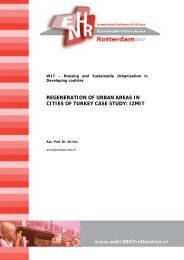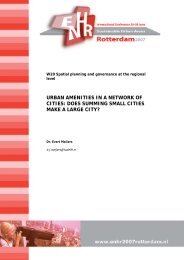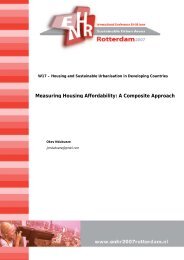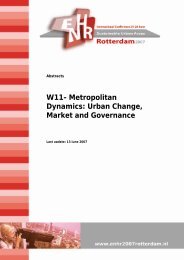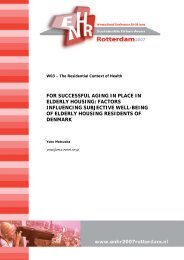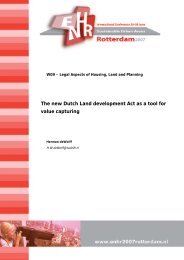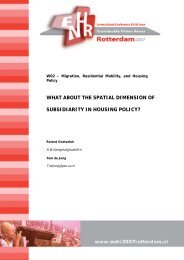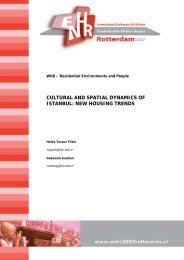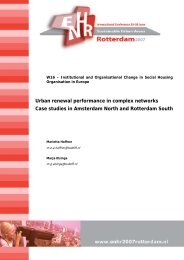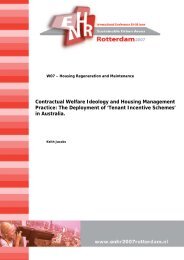Download - ENHR 2007 Rotterdam
Download - ENHR 2007 Rotterdam
Download - ENHR 2007 Rotterdam
Create successful ePaper yourself
Turn your PDF publications into a flip-book with our unique Google optimized e-Paper software.
Planning in process: AORTA as a new instrument for the upgrading of informal settlements in developing countries<br />
development scenarios with an 'AORTA toolbox' generate a sustainable basis for decision<br />
making of planning authorities and residents.<br />
Fig. 1: Perspective, design example of AORTA<br />
1 Introduction<br />
Urban and landscape planning in cities worldwide always means dealing with the<br />
phenomenon of informal settlements. In the beginning of the 21 st century about 1.000 million<br />
people – 30% of the world's urban population – live in such settlements without security of<br />
tenure. In threshold and developing countries this value can reach up to 50%. Prognoses say<br />
that – due to the ongoing urbanization – the number of people living in informal settlements<br />
can reach 2.000 million within the next 30 years. Problems in informal settlements are<br />
manifold: most households have only a low and sporadic income and the inhabitants are often<br />
excluded from political decisions and social processes. Access to public health care, to<br />
information and education is difficult; crimes and violence often menace the public order as<br />
well as the personal safety. Living conditions are mostly characterized by inadequate hygienic<br />
conditions and the lack of basic supply e.g. drinking water, electricity or communication<br />
systems. Houses are often made of insufficient material and most quarters have a very high<br />
population density. Public and private open spaces e.g. squares, streets, gardens or parks – the<br />
most important areas for social life in many countries – are rare and often in a bad state. Due<br />
to this strong concentration of social, economic and ecological problems and because of their<br />
high dynamic – the informal housing sector produces the majority of all new housing units in<br />
the cities of developing countries – informal settlements are of outstanding significance for<br />
the future development of urban agglomerations worldwide.<br />
1.1 Change of strategy<br />
In most cases, the emergence of these settlements is neither being initiated nor controlled by<br />
urban planning authorities. In many countries disregard or rejection of informal settlers have<br />
been the only reactions to the ongoing process of urbanization. Also many 'formal' planning<br />
approaches such as official housing programs failed because of their lack of adaption to the<br />
economic and social requirements of the residents. But changes in the strategy of problem<br />
solving appear: meanwhile more and more importance is attached to the upgrading of living<br />
conditions within existing informal settlements. The active involvement of local communities<br />
and their potentials and resources thereby become an existential part of the planning,<br />
implementation, monitoring and management process.<br />
1.2 A new instrument<br />
Considering the living conditions in informal settlements there are two aspects of increased<br />
significance for further development steps:<br />
2<br />
Workshop: Housing and Sustainable Urbanisation in Developing Countries<br />
Author: Moritz Groba, Jochen Hansen, Christian Krause, Christoph Ruckert



